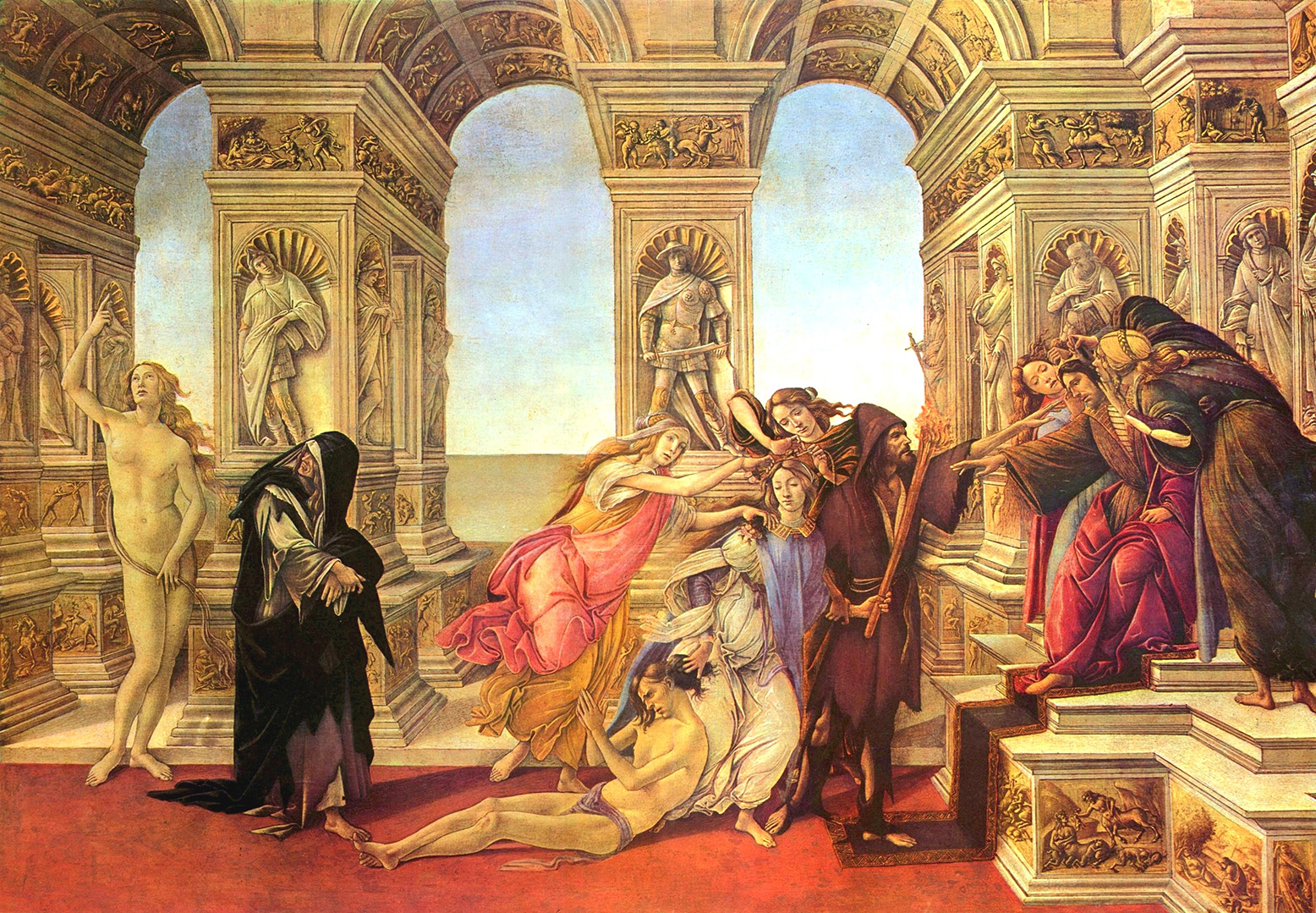Were the Romans blond and blue-eyed?
Translated from Evropa Soberana
Recently I was called names on VNN forum as a result of my criticism of anti-Nordicism in my previous post. Isn’t it ironic that the signature-legend of VNN’s admin states that the Jews must be exterminated while, at the same time, some of the forum’s senior members want to grant amnesty to the mudbloods in Europe?
Hopefully this abridged translation from the Spanish blogsite Evropa Soberana, which could be read together with the first installment about the phenotype of Greeks in Classical Europe, will throw more light on why anti-Nordicists are deluding themselves.

Were the Romans blond and blue-eyed?
The Latin malus [“bad”] (beside which I place mélas, Greek for “black”) might designate the common man as dark, especially black-haired (hic niger est), as the pre-Aryan settler of the Italian soil, notably distinguished from the new blond conqueror race by his color.
—Nietzsche, Genealogy of Morals
The Roman case is virtually identical to the Greek case. This YouTube clip contains the first minutes from the series Rome, where fighting between Gauls and Romans is recreated. The series had tremendous blunders, great nonsense, and several lies and BS in abundance. But the atmosphere was curious, as was the march of historical events, the legions in action, the splendor of the imperial palaces, the goings-on in the alleys of Rome, etc. One of the protagonists of the series was a centurion, the one with the whistle.
He was blond.
But how can you be so fascists so Nordicists, so Nazis so anti-Teresa-de-Calcutta, as Eurocentric and racists as these media? If you had a minimum of culture (like me) you should know that the Romans were of Mediterranean phenotype (like me)—and so on.
Things like these I have heard more times than you can imagine. And similar poppycock we continue to hear even by people who, by their admiration of Rome, obviously have read something written by these sober and tough soldiers who were the Romans, right?
In this article the testimonies from the handwriting of the real Romans are presented. Forget the movies and the illiterate pundits and let the sources explain us how Romans saw themselves.
The first Roman emperors as an example of patrician racial types
We will examine the phenotype of the first Roman emperors, who were representative of the race of patricians, the Roman nobilitas, i.e., the ruling aristocracy. What interests me is not so much to demonstrate the presence of Nordic blood in the upper Roman class (which is easy), but mainly to show that the Nordic blood in Rome was also inextricably linked to the notion of divinity and of noble descent. Some passages are originally in Greek. This is because Greek had great prestige as a cultured, poetic and philosophical language, and there were many Romans educated in that language.
• Augustus, the first Roman emperor, was “blond” (subflavum) according to Suetonius (De Vita Caesarum: Divus Augustus), and had “blue eyes” (glauci) according to Pliny (Naturalis Historia, XI, CXLIII):

He had clear, bright eyes, in which he liked to have it thought that there was a kind of divine power, and it greatly pleased him, whenever he looked keenly at anyone, if he let his face fall as if before the radiance of the sun (Suetonius, De Vita Caesarum: Divus Augustus, LXXIX).
• Tiberius had “gray-blue” (caesii) eyes according to Pliny (Naturalis Historia, XI, CXLII).
• Caligula had a “blonde beard” (aurea barba) according to Suetonius (De Vita Caesarum: Caligula, LII).
• Claudius had “gray-white hair” (canitieque) according to Suetonius (De Vita Caesarum: Divus Claudius, XXX), and “gray eyes” (γλαυκόφθαλμος) according to Ioannes Malelas (Chronographia, X, CCXLVI).
• Nero was “blond or redhead” (subflavo); had “gray-blue eyes” (caesis) according to Suetonius (De Vita Caesarum: Nero, LI), and descended from a family named after their light pigmentation.
Of the Domitian family two branches have acquired distinction, the Calvini and the Ahenobarbi. The latter have as the founder of their race and the origin of their surname Lucius Domitius, to whom, as he was returning from the country, there once appeared twin youths of more than mortal majesty, so it is said, and bade him carry to the senate and people the news of a victory, which was as yet unknown. And as a token of their divinity it is said that they stroked his cheeks and turned his black beard to a ruddy hue, like that of bronze. This sign was perpetuated in his descendants, a great part of whom had red beards. (Suetonius, De Vita Caesarum: Nero, I.)
• Galba had gray-white (μιξοπόλιος) hair according to Malelas (Chronographia, X, CCLVIII) and blue eyes (caeruleis) according to Suetonius (De Vita Caesarum: Galba, XXI).
• Vitellius was “redhead” (πυρράκης) and had “gray” or “blue” eyes (γλαυκός) according to Malelas (Chronographia, X, CCLIX).
• Vespasian had “gray-white hair” (πολιός) and “wine-colored eyes” (οινοπαης τους οφθαλμούς), although it is unclear whether this refers to red wine (brown) or white wine (green) according to Malelas (Chronographia, X, CCLIX).
• Titus, according to Wilhelm Sieglin (1855-1935) in Die blonden Haare der indogermanischen Völker des Altertums, 109, was “blonde”.
• Domitian was “blond” (ξανθός) and had “gray or blue eyes” (γλαυκός) according Malelas (Chronographia, X, CCLXII).
• Nerva was “gray-haired” according to John V. Day (Indo-European Origins).
• Trajan had “golden hair” (caesaries) according to Sieglin (Die blonden Haare der indogermanischen Völker des Altertums, 109). But let us not forget that Trajan was not Roman but a Spanish with Celtic blood, and therefore we should not take this into account when trying to define the phenotype of the Roman patrician aristocracy.
• Adriano, from a noble Roman family established in Hispania, was “dark-haired” (κυανοχαιτα) according Sieglin (Die blonden Haare der indogermanischen Völker des Altertums, 112), and of “gray or blue eyes” (γλαυκόφθαλμος) according to Malelas (Chronographia XI, CCLXXVII).
Interestingly, despite being described as “dark-haired,” on his statue there are traces of gold paint on his hair and beard. Formerly, the statues were painted according to the colors of the original “model”. His facial features correspond to the Nordic type.
• Antoninus Pius had “gray-white hair” (πολιός) and eyes “the color of wine” (οινοπαης τους οφθαλμούς) according Malelas (Chronographia, XI, CCLXXX).
• Lucius Verus had “blond hair” (flaventium) according Sieglin (Die blonden Haare der indogermanischen Völker des Altertums, 110).
• Commodus had “blond hair” (ουλόξανθος) and “blue or gray eyes” (υπόγλαυκος) according Malelas (Chronographia, XII, CCLXXXIII).
Therefore, we find that:
• Of the 18 emperors from Augustus to Commodus, 9 had blond or red hair, 5 had gray or white hair, of 3 we have no way of knowing the hair color, and only one (Adriano) was described as dark-haired.
• Of the 18 emperors from Augustus to Commodus, 9 had blue or gray eyes, 2 had eyes of “the color of wine” (whatever that means, let us take it as brown), and of 7 we have no record as to the color of their eyes.
Many emperors came to power in their advanced years, with already gray or white hair. However, many were even so described with light eyes. If we had records of their appearance when they were young, it is likely that a significant proportion of them had light hair. Of the 9 Emperors with light hair, we know that at least 5 had clear eyes, and of the other 4 we know nothing about the color of their eyes. Of Tiberius, for example, we know nothing about his hair, maybe because he was bald when he came to power. And the same applies to Otto, who shaved his head and wore a wig. Nor do we know anything about the physical aspect of the “philosopher emperor” Marcus Aurelius, father of Commodus and a first-class sovereign. Many other emperors (as Julius Caesar), without being blond, were tall and had a very fair complexion, ruddy, or rosy.
From Commodus on I renounce to provide more emperor descriptions because:
1 – those individuals who began ascending to power were not of Roman origin, and therefore their phenotype cannot tell us anything about the genetic legacy of the nobilitas of Italian and patrician origin.
2 – miscegenation was already quite advanced; lineages of patrician origin having lost their meaning. At that time it was common that women of Roman high society should shave the manes of Germanic slaves to fix their blond-hair wigs.
The gods, the Italici, the patricians and the origins of Rome
Let us go back around 1200 BCE and transport ourselves to Italy. At that time, Central Europe was a buzzing propagating zone for the Indo-European stock. From what is now Germany, of a semi-barbarous proto-civilization of the iron age, flowed migrant groups in all directions. These waves were of the Celts, the Hellenes, the Illyrians and the Italici (also called italos or italiotas).
At that time, the Italici, probably with some confederate Illyrian groups as in the case of the Dorians, broke into Italy.
They were a people who, in contrast to the native inhabitants of Italy, were patriarchal rather than matriarchal; ruddy rather than swarthy; that cremated their dead instead of burying them; that brought with them a whole pantheon of gods and heroic warriors, spoke an Indo-European language, yielded a war cult and whose symbology was a lot more oriented to heavenly than earthly symbols.
Italici were the settlers of sites such as the Villanovan Culture. Subsequent “civilian” conflicts that feminist history has termed as “matriarchy vs. patriarchy,” and what is left in mythology regarding the heroic struggle of the Indo-Europeans against the native, telluric bodies (like snakes) actually refer to a spiritual confrontation triggered by the arrival of a small, aggressive and martial people that did not mix with the native population and struggled to dominate the area.
Under a rigid religious ritualism, on April 21, 753 BCE the heads of some Italic clans founded the city of Rome. For two centuries, Rome lived under the despotism and tyranny of the Etruscan kings, heads of a degenerate civilization that practiced sacrificial rituals, orgies, matriarchy, homosexuality, luxurious opulence, pedophilia, decadent entertainments, etc. The Etruscans came from Asia Minor, styling themselves as rasena (“chosen,” as the Jews) yet their legacy, which only represented the decline of something greater than themselves, meant that they were a doomed people.
The situation of the Roman tribute to Etruria lasted until, in 509 BCE, the Romans rose against the Etruscans and expelled the Etruscan king, Tarquinius Superbus, from the lands. Legends want to portray that this Italic insurrection—a “holy rebellion” against the pre-Indo-European; of patriarchy against matriarchy—was motivated by the rape of Lucretia, a beautiful and virtuous woman of Roman family at the hands of Sextus Tarquinius, son of the Etruscan king and raunchy as all his people, as opposed to the Puritan morality of the Latins.
Lucretia committed suicide by honor and, this being the straw that broke the camel of the Roman patience, the patriarchs began a rebellion against the Etruscans that led to the overthrowing of the Etruscan kings, the founding of the Roman Republic and the systematic eradication of almost all Etruscan memory. (Comparable only to the “genocide” and the complete destruction of Carthage, the mortal enemy of Rome, considered as the reincarnation of Etruscan and oriental spirit, whose fields were cast in salt so that nothing would grow there.)

Recreation of Rome during the Republic. Pay attention to the shape of the boats, so reminiscent of the Scandinavian drakkar.
With the expulsion of the Etruscan power two praetors (later consuls) who held the vacuum of power were named. It was therefore founded the Roman Republic, marked by social struggles between patricians (nobles) and plebeians.
At that time, the original Populus Romanus was divided into 30 curiae (tribes or clans), whose origin was lost among the Italic peoples before the invasion. The curiae were headed by patres (parents) of the gens (family), that is, the founding fathers of the clan and of each family that composed it. Each gens or family was considered descendant of a genius or semi-divine patriarch, who was worshiped on the household as protector idol of the house and their descendants.
If we assimilate the fact that to the Romans a gens or family was a whole social, state, military and religious institution, we may understand the importance of the geniuses and patres as leaders of this small imperial cell, that corresponded to social, political and military leadership as well as leading positions in the characteristic Roman religious worship, where Jupiter is confused with the State, the patriarch, the Senate, the Legion and the family. No wonder, then, that they were regarded as semi-divine and of very high wisdom.
The patres were those who gave their name to the breed of the patricians, namely those belonging to the system of families and clans: the aristocracy, the first nobilitas, which differed from the plebs or plebeians—the people outside the Italic clans. At first, the male patricians were the only Roman citizens, the members of the Legion, the only ones who could be senators and enjoyed all the rights and duties traditionally associated with Roman citizenship.
Later, after the “universalization” and “cosmopolitanization” of Rome during the Empire, the patricians came to form an aristocracy over the other peoples of Italy, encompassed by the plebs. The patricians as social class, and among them the patres as heads of households, are probably the most exalted expression of patriarchy and patriotism itself of the Indo-European, in opposition to the narcotic matriarchy of the pre-Indo-European peoples of Europe, already decadents and altogether “civilized”.
♣
We now turn to the patricians and Roman gods from the point of view of the phenotype, after seeing the first Roman emperors, mostly patrician.
• Lucius Cornelius Sulla (138-78 BCE), Roman consul and dictator, of patrician descent, had blond hair, blue eyes and a ruddy complexion:
…for his golden head of hair gave him a singular appearance, and as for bravery, he was not ashamed to testify in his own behalf, after such great and noble deeds as he had performed. So much, then, regarding his attitude towards the divine powers. (Plutarch, De Vita: Sulla.)
What was the rest of his figure appears in his statues, but that fierce and unpleasant look of his blue eyes was still more terrible to stare at because the color of his face, being noted at intervals so ruddy and red mixed with his whiteness, and it is even said that he took his name from that, coming to be a nickname for the designated color. Thus, a teller of Athens taunted him with these lines: “If you knead a blackberry with flour, you have the portrait of Sulla.”
Marcus Porcius Cato the “Censor”, better known as Cato the Elder (234-149 BCE), the pronouncer of the famous saying Ceterum censeo Carthaginem esse delendam (“Furthermore, I think Carthage must be destroyed”) in every speech, had reddish hair according to Plutarch:
As for his outward appearance, he had reddish hair, and keen grey eyes, as the author of the well-known epigram ill-naturedly gives us to understand: “Red-haired, snapper and biter, his grey eyes flashing defiance, Porcius, come to the shades, back will be thrust by their Queen.” (Plutarch, Cato the Elder.)
• Poppaea Sabina (30-65 CE), the wife of Nero, famous for her beauty all over Rome, was very white and redhead.
We note that the Romans, like the Greeks, saw light pigmentation as a sign of the “divine” or “supernatural”. Some may interpret this that light pigmentation was rare among the Romans. But considering naming conventions, it is clear that the light features were quite common among the patricians. According to Karl Earlson:
Once they had reached a certain stage in their lives, the patricians earned their additional name (cognomina), which was often based on their physical appearance. The name Albus indicated light skin; Ravilla, gray eyes; Caesar, blue eyes; Flavius, blonde hair; Rufus, red hair; Longus, tall; Macer, a slender constitution. All these names were common among the patricians.
Thus, the Latin author Quintilian, in Institutio Oratoria (I, IV, XXV), notes that a man named Rufus or Longo has that name for his body characteristics: he is high or redhead. Plutarch (Coriolanus XI) states that two men, one redhead and one swarthy, could be distinguished because the first would be called Rufus and the second Niger. Aelius Spartianus, in Historia Augusta (II, IV), suggests that the Caesars earned their name from the fact that the founder of his gens had blue eyes (oculis caesiis). The lexicographer Sextus Pompeius Festus, in De verborum significatu (CCCLXXVI ff) states that the name Ravilia derives from “gray eyes” (ravis oculis), and the name Caesulla from blue eyes (oculis caesiis). Julius Paris, in De nominibus Epitome, VII, provides examples of names of women that, he says, have their origin in the pigmentation of those who held them: Rutila (red hair), Caesellia (blue eyes), Rodacilla (pink complexion), Murrula and Burra (red hair or ruddy complexion).
I have provided all these quotations to show that these names were not purely arbitrary but were, in fact, based on physical characteristics; and that these features were not uncommon among certain strata of Roman society.
Even where the patricians had almost disappeared, the Romans had memories of the old patres as the semi-divine beings who arrived to Italy, founded Rome, “Romanized” the peninsula and bequeathed the patriarchate to those lands, together with a strong mentality and a durable and effective political system that lasted for centuries. The ancient ancestors of the patricians were still considered in Rome as a common heritage to be proud of.
Karl Earlson summarizes how he follows Sieglin’s findings as to the pigmentation of the patricians and their identity as a breed:
Wilhelm Sieglin [in Die blonden Haare der indogermanischen Völker des Altertums, 1935] compiled the list of the Roman patricians whose names indicate light hair. He provided the following list: 7 Flavi, 20 Flaviani, 10 Fulvi, 121 Fulvii, 27 Rubrii, 26 Rufi, 24 Rufii, 36 Rufini, 45 Rutilii and 13 Ahenobarbi. This completely disrupts Sergi’s claim that: “The Romans also had their Flavi, indicating that people with fair complexion were rare and required a special name, but does not indicate that the Germanic type was considered aristocratic or dominant” (Sergi: 1901, 20). In fact, such people were not scarce.
Sieglin also determined that among the families Iulii, Licinii, Lucretii, Sergii and Virginii, the name Flavius was very common; Rufi was often seen among the families Antonii, Caecilii, Coelii, Cornelii, Geminii, Iunii, Licinii families (often also the Flavii), Minucii, Octavii, Pinarii, Pompei, Rutilii, Sempronii, Trebonii, Valgii and Vibii; Rufini was common among the gens Antonia, Cornelia, Iunia, Licinian, Trebonia and Vibia. Sieglin notes that this list could certainly be increased in the light of further research.
Besides all this, Sieglin also compiled a list of 63 blond or red-haired Romans. Many of these individuals were patricians. He also found references to 27 blond divinities (including Jupiter, Venus, Mercury, Diana, etc.) and 10 blondes in heroic personalities.
Man makes the gods in their own image. These blond gods speak of the racial nature of the early Romans. (In the Aeneid, Virgil refers to Mercury, Lavinia, Turnus and Camilla as “golden-haired.”) His list of blonds includes Aeneas, the mythical ancestor of the Latins (also blond was his son Julo or Ascanius), Romulus and Remus, the twin founders of Rome; Augustus, the first Roman emperor, and even Roma: which symbolized the city of Rome.
While most of Sieglin’s historical figures of light hair were patricians, most the 17 swarthy Romans in his references were commoners or freedmen.
On the disappearance of the patricians and the mestization of the original Romans
What happened to the patricians? They faded with time. In the numerous conspiracies and intrigues of the Empire, it was common that after the formation of two opposing parties and the victory of one over the other, the winner assassinated the head of the enemy party, his family and all the families related to him. (The strong destroy each other and the weak continue to live, as George Bernard Shaw maintained.) These calamities greatly decimated the patrician class. If we add the ongoing miscegenation in the majority of plebeian population, the immigration of slaves from Syria and the provinces of Asia Minor, Egypt and Africa, as well as the bleeding of the patrician stock over the battlefield, we may realize why the patricians did not last too long during the Empire, given the dysgenic situation. John V. Day wrote:
In a journal about the West and its future, it is fitting to end this article by briefly recounting the fate of the Roman upper class. Among Indo-European peoples, the Romans offer an especially useful example because they left masses of records, enabling later historians to determine what became of them. The evidence found in ancient texts implies that this class descended largely from Indo-Europeans who had a decidedly northern European physical type, although that isn’t something one reads in modern books about Roman history [emphasis added]. In Rome, though, the upper class was always a tiny minority. Instead of protecting its interests, it allowed itself to wither away. Consider a bleak statistic. We know of about fifty patrician clans in the fifth century B.C., but by the time of Caesar, in the later first century B.C., only fourteen of these had survived. The decay continued in imperial times. We know of the families of nearly four hundred Roman senators in A.D. sixty five, but, just one generation later, all trace of half of these families had vanished.
If we in the West want to avoid a similar fate, we must learn from Indo-European history. (*)
In the time of Julius Caesar we know 45 patricians, of which only one is represented by posterity when Hadrian rises to power. The Aemilsi, Fabii, Claudii. Manlii, Valerii and everyone else, except the Comelii have disappeared. Augustus and Claudius ascended 25 families to the Patriciate, and by the reign of Nerva all but 6 have disappeared. Of the families of nearly 400 senators registered under Nero in 65 CE, trace has been lost about half of them in times of Nerva. And the records are so complete that it can be assumed that these statistics represent quite accurately the disappearance of the male lineage of the families concerned. (Cf. Tenney Frank, “Race Mixture in the Roman Empire,” American Historical Review, Vol. XI, 1916).
Conclusion
Were the Romans, then, blond?
 It all depends on what you mean by “Romans”. The original Romans did not descend from the original inhabitants of the Italian soil, but of the Italici (italios or italiotas or as you please to call them) and probably also of Illyrian groups, namely, Indo-European invaders who entered Italy from the North, what is now southern Germany. These early invaders—from whom the Latins descended (considered the most influential and who eventually gave their language to the Empire), the Sabines (considered by Plutarch “a colony of the Lacedaemonians,” i.e., Spartans), the Umbrians, Samnites and all patrician clans that founded Rome and the Republic—were indeed mostly Nordic, and also formed the basis of the political and military elite of the Empire.
It all depends on what you mean by “Romans”. The original Romans did not descend from the original inhabitants of the Italian soil, but of the Italici (italios or italiotas or as you please to call them) and probably also of Illyrian groups, namely, Indo-European invaders who entered Italy from the North, what is now southern Germany. These early invaders—from whom the Latins descended (considered the most influential and who eventually gave their language to the Empire), the Sabines (considered by Plutarch “a colony of the Lacedaemonians,” i.e., Spartans), the Umbrians, Samnites and all patrician clans that founded Rome and the Republic—were indeed mostly Nordic, and also formed the basis of the political and military elite of the Empire.
However, in the later Rome these groups formed an aristocratic minority ruling over a mob of pre-Indo-European origin and, later, even Semites and black slaves. This ended up in interbreeding between all these groups. Over time, the numbers of the dominant Nordic caste withered, and with them their strong patriarchal, sober and authoritative influence in favor of the dissolution of the Empire: expressed in its cosmopolitanism, multiculturalism and proliferation of slaves.
The rest of the history of the post-Roman imperial splendor and their great men, we already know. It is set in a decadent agony, punctuated by binges, parties, orgies, wine snobbery, false sophistication, acrobats, gays, stupid fads, obesity, blond wigs made from hair stolen from Germanics, mongrels, pacifists, emboldened slaves, “liberated” women, Christian zealots and a corrupt bourgeois which reneged of their homeland.
The ghost of ancient Etruria, killed by the ancient Latin Patriarchs, had reborn. Before these decaying monsters, which had nothing to do with the demigod patricians or their rude peasants and patriotic soldiers, the Germanic “barbarian” was really an authentic, pure, hard, strong, noble, idealistic, simple and brave hero, in whose blood awaited the hidden forces of the Indo-European humanity, ready to give birth and germinate in the next millennia of European power.
In short, it has not been argued that all Romans were of Nordic type. It has been argued that the Nordic blood prevailed among the Italic invaders, the ancestors of the posterior dominant Roman aristocracy, the authentic Roman citizens, who imposed their ethos throughout the Empire and spread their spirit, marking the “Roman style” with a distinctly Nordic stamp.
“Are the Germanics a healthy and natural people that will overcome the decadence of the Romans?” —Tacitus, Germania.
_________________
See also a previous article about the subject of:
“Saying the truth about race throws even white nationalists into fits.”
(*) John V. Day, Ph.D., is the author of Indo-European Origins: The Anthropological Evidence (The Institute for the Study of Man, 2001).
 The best introduction to the sane side of the deMausean thought available on the internet appears in the third part of the book The Emotional Life of Nations, especially in the final chapters: “The Evolution of Childrearing” and “The Evolution of Psyche and Society.” However, even in the following pages, where I would like to spare the salvageable part of deMause’s legacy, I will continue the criticism of his psychohistory.
The best introduction to the sane side of the deMausean thought available on the internet appears in the third part of the book The Emotional Life of Nations, especially in the final chapters: “The Evolution of Childrearing” and “The Evolution of Psyche and Society.” However, even in the following pages, where I would like to spare the salvageable part of deMause’s legacy, I will continue the criticism of his psychohistory.








